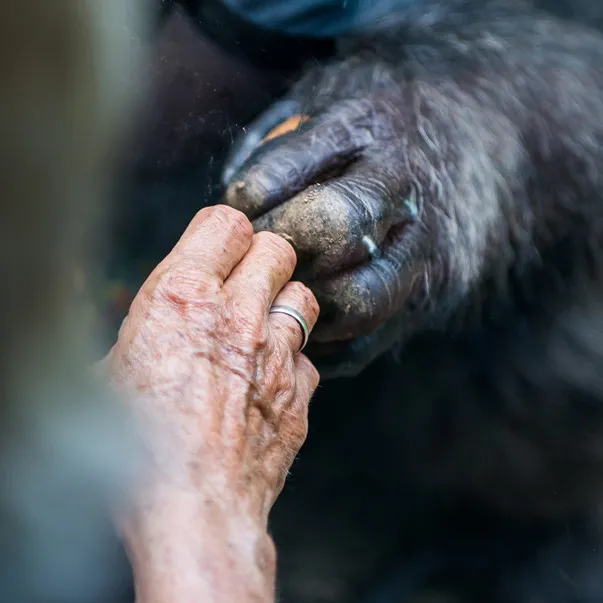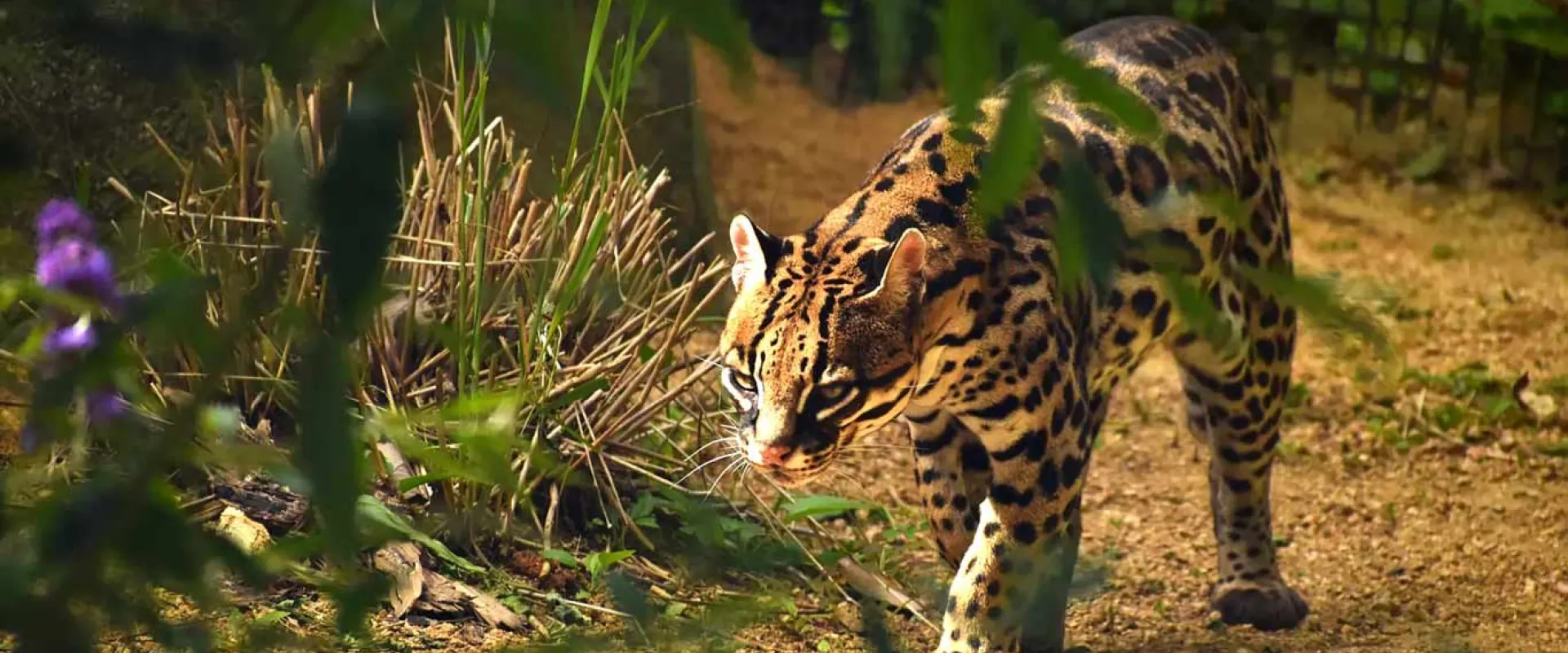
A wide range of programs...
The North Carolina Zoo Society's primary role is to support conservation, education, research and recreational programs at the North Carolina Zoo. The Zoo Society’s generous donors and loyal members enable the Zoo to do more than exhibit animals well. Gifts from the Zoo Society help the North Carolina Zoo
- contribute nationally and internationally to wildlife conservation and research;
- advance standards and practices that promote the well-being of animals in zoos and in the wild; and
- inspire people everywhere to respect, explore, care about and connect with nature.
Animal Care and Education
Veterinary Residency Program
The North Carolina Zoo, in cooperation with the North Carolina State University College of Veterinary Medicine, manages a three-year residency in zoological medicine, the veterinary specialty associated with the care of non-domestic species. The program, which admits one resident each year, offers top-tier training to veterinarians who will become world leaders in protecting the health of both captive and wild exotic animals. The North Carolina Zoo Society contributes $30,000 each year to support this training program.
The Valerie H. Schindler Wildlife Rehabilitation Center
The Valerie H. Schindler Wildlife Rehabilitation Center provides free veterinary and rehabilitation services to orphaned and injured native animals brought to the Zoo for treatment. The Center also provides significant training opportunities to residents, interns and other students who work or volunteer at the Center while they pursue careers in biology or veterinary medicine. Funds raised by the Zoo Society provide half of the money needed to operate the Center. Make an online donation in support of the Schindler Wildlife Rehab Center.
Animal Enrichment Programs
The Zoo’s animal enrichment programs serve the psychological and physical well-being of the Zoo’s animals by providing them with complex, changing and appropriate environments and social settings that encourage play, foraging and other natural behaviors. Donations from Zoo Society members and donors provide all of the funds used to operate these programs. Make an online donation in support of the Zoo's animal enrichment programs.
Collection Resources
The North Carolina Zoo Society is fully responsible for many of the expenses the North Carolina Zoo must shoulder to transport, acquire and manage its collection animals. Donors make it possible for the Zoo to maintain its animal collections and provide for their welfare needs.
Wild Welfare
The North Carolina Zoo helps coordinate efforts to improve the care of animals in some of the world's poorest zoos. Funding provides training, veterinary care and support to help animals held in poor conditions.
Conservation and Research
Field Research
The North Carolina Zoo Society funds, in full or in part, field research programs focused on African elephants, Cross River gorillas, polar bears and several other species. More information about those projects is available on the Save a Species page.
Conservation Medicine Program
Donations to the Zoo Society fully fund the Veterinary Staff’s Conservation Medicine program, which carries out research, provides training and purchases equipment related to the medical needs of rare and endangered species. For example, this program monitors the health of wild snakes found on the Zoo's grounds, surveys amphibian populations for disease, and studies the pharmacokinetics of white rhinos. Donate to Conservation Medicine
Sylvan Heights Waterfowl Park
The North Carolina Zoo Society and Sylvan Heights have enjoyed a relationship since 1994, when the North Carolina Zoo requested Zoo Society help in supporting this world-renowned breeding facility for rare and endangered waterfowl. Because of contributions raised by the Zoo Society, and particularly by Cheryl Turner (formerly the Society's Director of Development and now its Executive Director), the Sylvan Heights Waterfowl Park has expanded to include a recreational park that exhibits the largest collection of duck, geese and swan species in the United States.
Learning and Living
UNITE
The North Carolina Zoo’s UNITE conservation education and teacher training project in Uganda has been operating in the villages around Kibale National Park for more than ten years. UNITE promotes environmentally sound attitudes, knowledge and skills in native people by supporting local environmental and conservation education efforts. UNITE provides teachers with the tools and resources they need to teach about wildlife and resource conservation, and supports three Ugandan educators on a full-time basis to work with over 100 teachers in 10 local schools.
Art Programs and Acquisitions
These efforts expand the Zoo’s educational impact through the development and maintenance of the Zoo's impressive public art collection. To date, private donations to the Zoo Society has installed public art works valued at more than $2 million.
Valerie H. Schindler Wildlife Learning Center
Funded by donations to the North Carolina Zoo Society, the Schindler Learning Center provides affordable accommodations for college and university students participating in apprenticeships, internships and residencies at the Zoo. The Center also houses visiting artists, campers, scholars and other people engaged in work or study that advances the Zoo’s missions in conservation, education, recreation and research.
fieldtripEARTH
Initially developed in 2002 under a grant from the federal Institute of Museum and Library Services and now funded entirely through donations to the Zoo Society, the website fieldtripEARTH (http://fieldtripearth.org) serves K-12 students by linking them to conservation researchers working around the world. The website serves classrooms in all 50 United States and in more than 140 countries.
Keepers in the Classroom
This program, which is funded exclusively by donations to the North Carolina Zoo Society, educates and inspires students by sending zookeepers and other zoo professionals into classrooms to teach students and to mentor them if they choose to complete environmental projects that benefit their schools. Keeper mentored programs have engaged students in creating butterfly-attraction gardens and hiking trails, and in organizing environmental field-days and work projects.
Kidzone
Kidzone is an area in the North America region of the Zoo designed to encourage children to play outdoors. It provides a safe, reliable place for children to explore and connect with nature. Kidzone also houses the RTI International Training and Research Center for Children and Nature. This facility is a centerpiece for the Zoo’s growing professional training programs in Playful Pedagogy.
Smart Carts
Smart Carts are small, portable and hands-on learning stations packed with interesting biological specimens and staffed by enthusiastic staff and volunteers eager to share their knowledge of the Zoo and its animals. These stations, which are funded primarily by gifts to the Zoo Society, reach out to the Zoo’s 800,000 plus annual guests.
Horticulture
The Zoo’s plants define the animals’ habitats, beautify the landscape, buffer the exhibits, provide shelter and shade for animals and visitors and create a setting that seems more like a park than a zoo. These plants, and the Zoo’s endangered plant programs and greenhouses, depend on Zoo Society donors and supporters to fund their needs.
